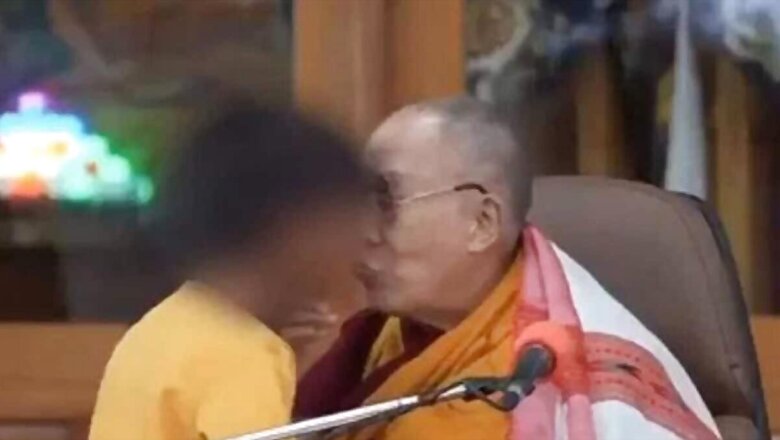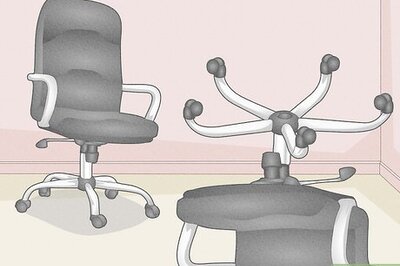
views
The so-called modern mind is cursed with faithlessness. Ironically, it takes pride in it. It thinks faith is an antithesis to rationality. To add to it, it is also afflicted with a judgmental and know-it-all trait. Even the greatest of the souls can be judged, abused, and called names in no time.
It happened last week with the 87-year-old Dalai Lama. A monk par excellence, the Tibetan leader has lived all his life preaching and practising love, compassion and non-violence. But that hasn’t stopped the ‘modern’, ‘rational’ mind from judging him. Why? Because he kissed a boy and asked him to “suck his tongue”! That very evening, I heard one of my colleagues in journalism saying, “What’s wrong with the Dalai Lama? I have stopped believing in these babas.” A few others sitting with her nodded their heads in vindication
Faithless… judgemental… know it all!
Even before one does a psycho-cultural analysis of the Dalai Lama’s act, the ‘modern’, ‘rational’ mind should have at least done the basic homework. The event, which took place in late February at the Dalai Lama’s monastery in Dharamshala, was attended by about 100 young students. In a video that has gone viral, a child requested His
Holiness: “Can I hug you?”
Hearing this, the Dalai Lama asked the boy to come up to the platform where he was seated. Touching his cheek, he said, “first here”, after which the child kissed him and gave him a hug. The Tibetan leader held him lovingly in his arms and said, “I think here also” — and he planted a kiss on his lips. And then he asked the boy to “suck my tongue”, sticking out his tongue. Forehead to forehead with the Dalai Lama, the boy quickly stuck out his tongue.
What was missing in this carefully edited video was how the Dalai Lama laughed and pulled the boy in for another hug. What was cut out was how the entire incident was duly photographed and hailed by those present there. What was also deliberately kept out was that the boy’s mother was present at the event, sitting near the Dalai Lama.
When I saw the unedited video of the event, rewinding it again and again, all I could sense was a grandfatherly banter. It evoked the memory of my late grandfather. Of course, he would not ask me to “suck his tongue”! He was not a Tibetan, after all! But I felt the warmth, the tenderness and the unassuming simplicity of my grandfather. He would often pull my shirt and aggressively kiss the stomach. His freshly grown up beard would create sensation and I would laugh no end. At a time when faithlessness looms large, it seems there is no space for grandfatherly banters. Everyone is a suspect, till proven otherwise.
This takes us to the third aspect of this episode: The know-it-all phenomenon. Modern mind seems to believe that it knows everything, even when all it knows is its own cultural mores — and that too quite scarcely. There’s also a tendency to uniformise global diversity. So, ‘hello’ and ‘hi’ have become a normal way to greet people. What if someone greets you with his tongue out? You may be offended, may even resort to violence. But that’s how Tibetans greet. In Tibet, sticking out your tongue has been a traditional way of saying hello. It is also a sign of respect and — as a Tibetan friend of this author said — “an elderly person’s unconditional love for a young one”.
The practice had its origins in the 9th century when a tyrant king with a black tongue died. The Tibetans believe in reincarnation, and by sticking their tongues out, they prove they aren’t the tyrant reborn. Had one known this story, one would have realised the flippancy of the uproar. The Dalai Lama could still have been accused of committing a mistake had he done the same in a non-Buddhist event in Delhi or New York. But he was in Dharamshala, mostly amid his own Tibetan people. Still, following the uproar, His Holiness apologised for his ‘inappropriate’ and ‘scandalous’ behaviour.
The know-it-all liberal mind should also have realised the timing of the incident, coming as it did soon after the Dalai Lama had announced the selection of an eight-year-old US-born, Mongolian boy as the 10th Khalkha Jetsun Dhampa Rinpoche, the third most important spiritual leader in Tibetan Buddhism. As this writer wrote in detail in the 27 March 2023 article in Firstpost, the recognition of the Mongolian boy has stumped the Xi Jinping dispensation, giving it a nightmare on the Dalai Lama succession issue. The Xi Jinping administration knows it well that that the institution of the Dalai Lama is the strongest bulwark against Chinese hegemony in Tibet. If it can’t be removed, then it should at least be discredited. That’s what seems to be the motive behind the mischievously edited Dalai Lama video.
Tibetans alone don’t have ‘weird’ traditions. For instance, there are many cultures where smiling isn’t seen as a friendly gesture. In some Latin cultures, one smiles to say “Excuse me” or “Please”. Also, if someone does not return your greeting smile, this doesn’t mean some sort of enmity or hostility. Some Asian cultures reserve smiling for informal occasions; smiling while being formally introduced is considered disrespectful.
Likewise, Indians, Europeans and Americans are mostly advised to make eye contact while interacting with others. Not making eye contact is seen as a sign of disinterest, evasiveness and elusiveness. But in many cultures, including Korean, avoiding eye contact is a sign of respect.
Diversity is equally evident in table manners across the world. In China, for instance, making a mess of the table is seen as a sign of the guest enjoying the meal. You should also leave a bit of food on your plate to make the host think that you are full and have enough to eat — one is, however, advised not to leave any rice leftover in the bowl. Likewise, in Egypt, one is expected not to fill his own glass for water — it is the job of his immediate neighbour on the table to fill his glass! In Afghanistan, when a piece of bread drops on the floor, it’s lifted and kissed. And in Canada, guests should not come on or before time; it’s acceptable for them to come late.
As for Indians, they have taken, obviously out of coloniality, the Western table manners to a different level. So much so that my yoga teacher was bemoaning the other day how most of his young students couldn’t sit properly, and were prone to joint and back problems very early in their lives! The tradition of sitting cross-legged on the floor is almost extinct, especially in urban homes, though some families have realised its importance and are striving to bring it back into their lives.
It’s a case of utter coloniality because there’s a tendency among educated Indians to look down upon ‘lesser’ Indians, while gleefully accepting the same mistakes from their Western counterparts. Mispronounce a French or a Latin word in a group of educated individuals, and suddenly there would silence that would intermittently break with hushed up giggling noises. Some ‘braveheart’ polyglots may even stand up to mock at your egregious error. But the same courtesies are never extended to Europeans when they mispronounce Indian names and words. Punjab is often pronounced as “Poonjab”, but no one laughs — and even fewer rush to correct them!
The Dalai Lama saga is a reminder to the modern, tech-savvy man about the loss of his faith and reasoning. This has made him shallow and bottomless. He is full of information, but has a dearth of understanding. This has made him a faithless, judgemental and pretentious know-it-all being.
Arun Shourie once narrated to this writer a touching encounter with the Dalai Lama. In 2017, he had invited His Holiness for the release of his book, Two Saints, based on Ramakrishna Paramahansa and Ramana Maharshi. Shourie would always ask his son, Aditya, who has cerebral palsy, to release his books, and on this occasion he asked him to present a copy to the Dalai Lama.
“I can’t forget that moment. While presenting the book to His Holiness, Aditya placed his hand on his head. And this great monk bowed in front of Aditya. His Holiness laughed, and sought more blessings from Aditya. My son’s condition doesn’t allow him to look attentively at anything for a long time, but that day he kept looking at the Dalai Lama with an undivided gaze and attention,” Shourie recalled. Later during his speech, Shourie added, His Holiness again mentioned how touched he was to receive Aditya’s blessing.
This is the real Dalai Lama. By judging him, the so-called modern mind has only exposed its fallacy and hollowness. His apology, in that way, is the noble soul’s apology on behalf of humanity, on whom the Dalai Lama’s faith has not wavered a bit despite seven decades of suffering and hardship.
The author is Opinion Editor, Firstpost and News18. He tweets from @Utpal_Kumar1.
Read all the Latest Opinions here














Comments
0 comment